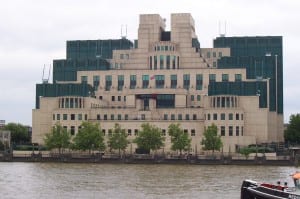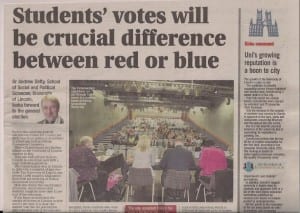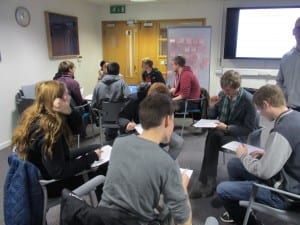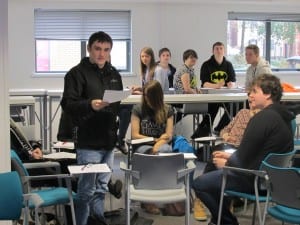 The following essay by first year politics student, Thomas Eason, was winner of the 2015 University of Lincoln School of Social and Political Sciences prize (sponsored by Oxford University Press) for the best first year essay in politics and international relations.
The following essay by first year politics student, Thomas Eason, was winner of the 2015 University of Lincoln School of Social and Political Sciences prize (sponsored by Oxford University Press) for the best first year essay in politics and international relations.
The British Intelligence and Security Services consist of three agencies all of which are operating for the government each with significant power that is largely utilised covertly. The three main agencies consist of the Secret Intelligence Service (MI6) which deals with Britain’s political and economic interests abroad (Jones and Norton, 2014, 495), Government Communications Headquarters (GCHQ) which operates to gather intelligence through interception of communications (Cabinet Office, 2010, 8) and the Security Service (MI5) which is responsible for protecting the UK against covertly organised threats to national security including terrorism, espionage and proliferation of weapons of mass destruction (Cabinet Office, 2010, 10). Due to the sensitive nature of the British intelligence services they inevitably need the powers necessary to operate secretly and effectively against enemies of the state (Budge et al, 2001, 536). This mixture of power and secrecy raises questions as to just how accountable this secret arm of the government really is. This is because under a democracy all branches of the state should be publicly accountable (Budge et al, 2001, 536).
It is important in a democratic society that there are effective safeguards and means of overseeing the work of the secret intelligence agencies with clearly defined political accountability for their activities (Cabinet Office, 2010, 27). Historically intelligence and security matters within the UK have not been subject to parliamentary scrutiny or debate (Bochel et al, 2010, 483-487). However more recently there has been a rise in more formal ways of subjecting the intelligence services to public accountability (Moran, 2011, 418). Democratic oversight has to focus on two key areas, it should make the intelligence agencies more accountable and it must regulate the covert relationship between the agencies and the executive to prevent abuses (McDonald, 2014).
Accountability and oversight is provided in three ways: through Ministers who are accountable to Parliament for the activities of the agencies, through Parliament itself to provide politically independent oversight of agency activity and through the independent commissioners who provide judicial oversight of the agencies with particular regard to warrants. The commissioners also work with an Investigatory Powers Tribunal that investigates complaints by individuals about the agencies’ conduct towards them (Cabinet Office, 2010, 27). This essay will investigate if the British intelligence and security services are democratically accountable under the three methods of accountability that are currently used in the United Kingdom and will argue that while the intelligence and security agencies are democratically accountable under the current system, this is in a very limited and constrained sense.
Ministerial oversight is one method of ensuring the intelligence agencies are democratically accountable. Ministers not only give instructions to the agency heads they also answer to Parliament for any issues regarding the intelligence agencies. The Foreign Secretary is answerable to Parliament for the work of MI6 and GCHQ while the Home Secretary is answerable to Parliament for issues regarding MI5 (Cabinet Office, 2010, 7-11). The Prime Minister has overall responsibility for intelligence and security matters and thus he is accountable to Parliament for matters affecting intelligence collectively (Cabinet Office, 2010, 16). Ministers being accountable to Parliament on behalf of the agencies ensures that not only are the Ministers monitoring the activities of the agencies but they are also allowing some level of Parliamentary scrutiny with Ministers acting as a conduit between the agencies and Parliament.
Due to the fact the intelligence services work under the authority of Ministers while under the control of their Directors (Leigh, 2009) each Director must provide annual reports on the work of their services to the Prime Minister and their Secretary of State (Cabinet Office, 2010, 16) this ensures the intelligence agencies are watched over by an elected representative providing some level of democratic accountability. The Secretaries of State are responsible for signing warrants for the relevant agencies to authorise them to intercept communications and conduct surveillance operations. This ensures the major decisions are taken by a high ranking elected representative accountable to Parliament, it also ensures the Secretaries of State are informed about the operations the intelligence agencies are conducting.
However, arguing democratic accountability is provided because Minsters oversee the intelligence agencies assumes Ministers take an active role in scrutinising the work of their agencies just as it also assumes Parliament will be interested in scrutinising the Ministers regarding the agencies. Historically this has not been the case, Parliament has not always taken an interest in the work of the agencies and it is unclear that Ministers were much more attentive (Bochel et al, 2014, 36). Some Ministers found the business of dealing with the intelligence agencies distasteful and have kept them at arms length (Bochel et al, 2014, 37). This indicates that Ministers my fail to provide democratic accountability because they do not adequately scrutinise the work of the intelligence agencies they instruct.
Another problem associated with relying on Ministers to scrutinise their intelligence agencies is that the executive, which uses and instructs the agencies, is also responsible for scrutinising them thus creating a democratic deficit. There is a strong suspicion that governments have sometimes enforced secrecy not in the public interest (Budge et al, 2001, 540). To ensure democratic accountability the covert relationship between the executive and these agencies must be scrutinised to prevent abuse (McDonald, 2014).
The democratic deficit from Ministerial oversight and potential for abuse of the intelligence agencies by the executive has lead to the creation of a committee of Parliament called the Intelligence and Security Committee. This committee provides Parliamentary oversight over MI6, GCHQ and MI5 consisting of nine parliamentarians from across political parties (Cabinet Office, 2010, 29). The committee members are nominated by the Prime Minister and are appointed by the Houses of Parliament (Intelligence and Security Committee, 2013). Under recent changes the Committee reports to the Prime Minister and directly to Parliament after their reports have been censored to maintain secrecy (Mullin, 2013). This provides a level of democratic accountability as the agencies are exposed to Parliamentarians who can investigate and oversee different aspects of the expenditure, administration and policy of the three agencies (Cabinet Office, 2010, 29)
Allowing Parliamentarians to oversee the Intelligence Agencies through the Intelligence and Security Committee has exposed intelligence agency staff to the democratic process in a way that has never occurred in the past (Bochel et al, 2014, 75). The Intelligence and Security Committee not only provides a level of accountability by opening the intelligence agencies to scrutiny from Parliamentarians (and by extension parliament) but it also ensures accountability is not just provided by the Ministers that use the agencies.
However, while Ministers might not be members of the Intelligence and Security Committee a large number of MPs question the calibre of the appointments to the Intelligence and Security Committee, with a large number of appointees being ex-Ministers. This raises questions as it means that people who once authorised and oversaw the agencies in a Ministerial position are now overseeing them in the Intelligence and Security Committee. Thus they may be less willing to ask difficult questions that could cause problems for agency heads or the Ministers in government, this may limit the true level of oversight and democratic accountability it provides.
The committee could also limit Parliamentary accountability by posing as an obstruction to other Paramilitary committees (Andrew et al, 2009, 344). This has historically been the case for example when the Foreign Affairs Committee undertook an inquiry looking into the events in Sierra Leone the Foreign Secretary refused to allow the heads of MI6 to appear before the committee stating the Intelligence and Security Committee was appropriate to examine the work of the Secret Intelligence Service (Bochel et al, 2014, 113). This suggests the Intelligence and Security Committee has prevented wider democratic accountability by blocking select committee investigations.
The third method used to oversee the intelligence and security agencies is through the Intelligence Services Commissioner, the Interception of Communications Commissioner and the Investigatory Powers Tribunal (Cabinet Office, 2010, 32-31). Both Commissioners are required to have held high judicial office indicating they are expected to have strong knowledge of judicial and legal proceedings. This provides a level of accountability which is separate from Parliament ensuring there is a greater distinction between the people who use or have used the intelligence agencies and the people who provide oversight. The Commissioners and Tribunal also protects the intelligence agencies from becoming completely politicised.
The Intelligence Service Commissioner reviews the warrants signed by the relevant Secretaries of State as well as authorisations for operations (Cabinet Office, 2010, 31). The Interception of Communications Commissioner reviews the issue of warrants permitting the interception of mail and telecommunications by the intelligence and security agencies as well as procedures for how this material is handled (Cabinet Office, 2010, 31). The commissioners are able to visit the agencies to discuss any case they wish in more detail, they must also be given access to whatever documents and information they need. The Commissioners only consider warrants however therefore they are unlikely to identify any illegal conduct by the agencies. This could lead to questions about if the Commissioners really provide accountability or if they are just an excuse to prevent any wider accountability being implemented outside of Parliament.
At the end of each reporting year the Commissioners submit reports to the Prime Minister that are subsequently laid before Parliament and published (Cabinet Office, 2010, 31). In these reports the Commissioner registers the number of warrants issued in a confidential annex while openly recording the number of complaints investigated and the number upheld following the investigation (Andrew et al, 2009, 341). One criticism of these reports however is they often contain very little substance with the Commissioners only reviewing a limited number of warrants.
The Commissioners assist the Investigatory Powers Tribunal which investigates complaints by individuals about the agencies conduct towards them or about interception of their communications (Cabinet Office, 2010, 32). If the Tribunal upholds a complaint it has the power to order action as it sees fit including to award damages to the complaint (Cabinet Office, 2010, 32). The Investigatory Powers Tribunal provides a limited mechanism to not only hold the intelligence agencies to account but also to provide justice to those mistreated by the agencies. The tribunal operates in secret thus its decisions are bared from judicial review. This means its decisions can not be investigated in real detail to see just how fair, balanced and effective it is in its operation.
It is clear that striking a balance between security, liberty and accountability will continue to present a major challenge for the government (Heffernan et al, 2011) particularly with regard to the secret intelligence agencies. While there is a need for secrecy due to the nature of their work, there is also a need for democratic accountability to ensure the agencies and the executive that wields them are not using them in a way that compromises democratic principles. At present the British intelligence and security agencies are accountable using three methods of oversight each with the aim of ensuring democratic accountability. It is clear that these methods of accountability do provide oversight for the intelligence agencies with some arguing that the simple existence of institutions such as the Intelligence and Security Committee are enough to cause the agencies to reflect on proposed actions in advance of undertaking them (Heffernan, 2011, 353). However all of these mechanisms have significant weaknesses which could undermine the extent to which they hold the intelligence and security agencies to account. This indicates that while the agencies are democratically accountable it is only to a limited extent with Britain being unusually secretive by Western Standards (Budge et al, 2001, 536).
References
Andrew, C., Aldrich R.J. and Wark, W.K. (2009) Secret Intelligence a reader. Abingdon: Routledge.
Bochel, H., Defty, A. and Dunn, A. (2010) Scrutinising the secret state: parliamentary oversight of the intelligence and security agencies. Policy & Politics, 38(3) 483-487.
Bochel, H., Defty, A. and Kirkpatrick, J. (2014) Watching the Watchers Parliament and the Intelligence Services. Basingstoke: Palgrave Macmillan.
Budge, I., Crewe, I., McKay, D. and Newton, K. (2001) The New British Politics. 2nd Edition. Essex: Pearson.
Cabinet Office. (2010) National Intelligence Machinery.
Intelligence and Security Committee. (2013) Intelligence and security committee of parliament: committee members.
Jones, B. and Norton, P. (2014) Politics UK. 8th Edition. Abingdon: Routledge.
Leigh, I. (2009) Changing the rule of the game: some necessary legal reforms to the United Kingdom intelligence. Review of International Studies, 35(4) 943-955.
McDonald, K. (2014) Proper Parliamentary oversight of the security services is desperately needed. London: The London School of Economics and Political Science.
Moran, M. (2011) Politics and Governance in the UK. 2nd Edition. Basingstoke: Palgrave Macmillan.
Mullin, C. (2013) Can the security and intelligence services answer the accountability question?. [online] The Guardian.
Heffernan, R., Cowley, P. and Hay, C. (2011) Developments in British politics. Basingstoke: Palgrave Macmillan.



